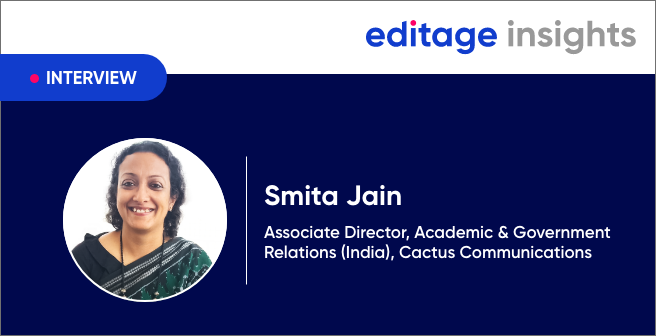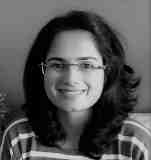Careers outside academia: Interview with Smita Jain
Careers outside academia
Graduate students, early career researchers, or even established researchers may sometimes be unaware of opportunities other than the traditional path of academic research. This series aims to introduce them to exciting and rewarding careers that can be pursued outside academia. We bring you interviews with experts from diverse backgrounds who share their experiences from their non-academic journeys and tips on how to transition to these paths.

This post is the first of a series of interviews on the topic “Careers outside academia.”
Could you tell us a little bit about your professional journey so far and the type of work you have done outside the typical academic career path?
While pursuing my undergraduate studies, I received the Rajiv Gandhi summer fellowship, which allowed me to spend two months in a lab at one of the premier research institutes of India—The Indian Institute of Science (IISc). That opportunity and the experience there changed the course of my life. It not only brought me closer to the world of science but also planted the desire in me to come back to IISc to do a PhD. And a few years later, I joined the institute as a PhD student.
I got into a newly established lab and thoroughly enjoyed the ups and downs of doing a PhD, while at the same time learning a lot. However, towards the end of my PhD, I realized that the research world is not for a person with a temperament like mine. The thought of tying myself to a research lab and pursuing a research problem for the rest of my life was not exciting enough to hold me within that world, and I decided to do something different. What? I didn’t know! However, the foundational training and the skills I had gained till that point in my life helped me move further with confidence and courage, and I decided to explore what came my way.
I worked in industry for the next 3 years before I took a break because of my second pregnancy. I was busy with my two young ones while simultaneously doing a variety of things—from teaching to art workshops for kids to pursuing my own hobbies and most importantly, raising two kids to grow up as independent and balanced individuals. That period also gave me time to introspect, and I finally decided to move out of wet-lab work.
The Centre for Cellular and Molecular Platforms (C-CAMP), with its state-of-the-art research facilities, had just been established. I joined them as part of their business development team and fully immersed myself in the setting up of yet another new establishment. I also realized that scientific administration and management is where my passion lies. With my understanding of the science involved, it was easier to connect with the research community, grow the network, and bring in the required business.
After five wonderful years at C-CAMP in a managerial role, I next joined IndiaBioscience in a leadership role. This platform gave me space to connect with the vast life science community, grow the existing programs, and initiate a few new programs for the benefit of the community, all of which further honed my leadership skills. It gave me the opportunity to forge new relationships across the academic and government sectors in India and carry out some meaningful work in the research management and communication space, for the betterment of the life science research community. Here, I found some amazing mentors who helped me grow both personally and professionally.
The work we did at IndiaBioscience is something I am very proud of. The amazing team at IndiaBioscience worked tirelessly to organize some very useful events and to curate some great content for the life science community in India, among conducting other activities. In particular, we were trendsetters in India when it came to sharing insights related to non-academic career opportunities. For instance, we brought out a free, downloadable book titled Disha for life science students, which provides all relevant information about career opportunities they can pursue in India.
After over five wonderful years at IndiaBioscience, the adventurer in me was ready for the next phase of my career. So, when the opportunity to work as Associate Director, Academic & Government Relations, at CACTUS presented itself, I decided to take up the challenge, this time venturing into the world of business. However, I knew that I would remain connected with the scientific community, with whom I have been working for over a decade. Currently, I am working toward establishing of CACTUS’ business and building its brand in India. Each success and failure is a new learning—something that I look forward to every day.
What helped you make this transition? Did you face any challenges?
I very strongly believe that even if one does not know what he/she/they want from life, knowing what one does not want always helps. Back in my school days, the obvious expectation from a top-performing student was that they pursue a career in medicine, but I was clear that I cannot stand the environment of a hospital and so I chose not to follow that path, creating a huge uproar among my teachers. Something very similar happened when I decided not to go for a postdoc after my PhD, and it still pains me that my relationship with a mentor turned sour at that juncture. However, my conviction that my life’s decisions must be taken by me and not others guided me in a direction that eventually brought me where I wanted to be. Also, the ever-lasting support of my parents and, later, my spouse and some great mentors I found on my way have always helped me in making and sticking to these life decisions.
Some of the core values that were inculcated in me by family and teachers early on, and some that I developed throughout my career, have been extremely helpful in making this journey more meaningful and fully enjoyable. They also helped me step ahead with courage, confidence, and a forward-looking approach toward building a career. I have always remained true to myself and everyone around me, worked hard with utmost dedication, remained empathetic to the world around me, and stayed focused on my goals.
There have been multiple challenges along the way! Well, challenges are what make life interesting, but overcoming them is what makes life meaningful. The roles I played in the early stages of my career were never well defined, and I was very unsure of what was expected of me. However, staying focused and ensuring open communication helped. Throughout my career, I received negative comments about not using my degree to the fullest, but I never paid attention to these.
Being a woman who is required and expected to nurture a family and simultaneously develop her career was and, till date, has been a constant challenge. There were not enough female role models or mentors, or platforms to discuss the unique challenges that a woman in science faces. However, what helped was deciding my priorities depending on the stage of my life, accepting the fact that I cannot have it all, setting my boundaries with respect to expectations and responsibilities, being vocal (in a positive manner) when required, creating a support system, and raising my children such that they become independent.
What types of career opportunities can PhD students and researchers explore outside academia?
Simple answer—many! Every career path is unique and demands specific personality traits and skill sets. So, it is of utmost importance that you have a clear understanding of what your skills, natural talents, and interests are; what sources of motivation can help you stay engaged in a career through difficult times; and what your values are, since these will give you purpose. This self-analysis and understanding are essential while choosing the path from among the myriad opportunities that exist out there. The notion that the only path open to those studying science is research doesn’t hold true any longer according to me. There is already a lot of information about the different types of career opportunities outside academia.
What is important to keep in mind while choosing a career option outside of the traditional academic path is that it’s your life decision, not anyone else’s, and opting to move outside academia is not a failure.
Based on your experience, what would you say are the 3–5 most important points a PhD student or researcher should consider when exploring non-academic career paths?
The Japanese proverb “The frog in the well knows nothing of the sea” is very apt for most students who come out of the academic institutions in India. Their lack of awareness or understanding of the world outside limits their true potential. Thus, it is of utmost importance that science graduates are well informed about the diversity of career options and the world that exists beyond the four walls of their home/labs/academic institutions. Other than having the right information, it is important to have a strong network of people from diverse backgrounds whom one can reach out to for guidance and for information/insights not readily available through other channels. It is also crucial to move ahead with confidence and courage, without worrying about others’ perceptions/opinions.
Often, a student or researcher may have the right information and the right mindset but lack the art of presenting themselves effectively to the world outside academia and, thus, fail to create a positive impression. So, it is important to learn how to deliver the right elevator pitch, how to write a strong and to-the-point cover letter, tailor their CV/resume for the job they wish to apply, etc.
Having deep technical knowledge, both theoretical and practical, is vital. But equally important is having the right soft skills, like good oral and written communication, logical and problem-solving skills, time/people management, the ability to work with diverse teams, and flexibility. In academia, researcher evaluations are mostly based on technical skills and thus not enough importance is given to soft skills, but they contribute equally, or may be more, to success in long run.
In today’s fast-paced world, having a learning mindset is a must. Having a degree in hand is not enough. To stay relevant, one needs to be a lifelong learner.
I strongly feel that the above points are equally important for those who are starting their careers afresh and those who have experience.
Comments
You're looking to give wings to your academic career and publication journey. We like that!
Why don't we give you complete access! Create a free account and get unlimited access to all resources & a vibrant researcher community.

Subscribe to Career Growth
































